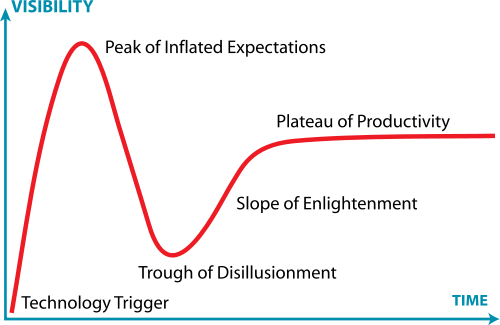Where green-collar jobs are concerned, we’re in the backlash phase of the hype cycle: the “trough of disillusionment.” The New York Times and Seattle Post-Intelligencer have both published contrarian pieces on green job programs recently, pronouncing them failures or disappointments. Reasoned rebuttals are here [and here] and here, respectively.
What I wanted to say, though, is that I’ve been expecting this backlash for some time. Hopes got too high, too soon for a green jobs explosion. That’s why our primer on the subject went to lengths to name the many pitfalls jobs programs must avoid. Many barriers have long prevented the emergence of a self-sustaining building energy upgrade industry that offers pathways out of poverty for low-skill workers. The technical potential of energy efficiency is abundant, but the market is riddled with failures, fissures, and flaws. So green-jobs programs have always faced challenging odds.
Still, just as early media attention to green jobs was too bullish, the current round is too bearish. I asked a thoughtful Northwest practitioner for a reality-check update on local progress. Here’s what I got from Alex Ramel, who coordinates a green jobs program called the Community Energy Challenge (CEC) in Bellingham, Washington.
The CEC recently celebrated the completion of 500 home energy assessments and has helped more than 200 local homes complete energy efficiency retrofits. More than 100 home retrofit projects are currently in process. At the same time, the CEC has worked with more than 80 small businesses to implement energy efficiency improvements ranging from light bulb changes to heat pumps to solar photovoltaics.
The CEC is a Whatcom County green jobs program that helps local homes and businesses save energy and money through low-cost energy assessments and personalized recommendations.
“We opened the doors for this program just over one year ago,” says Shawn Collins, the CEC program manager with the Opportunity Council. “In that time, we have helped 500 homeowners make smart decisions about how to cut their energy costs. Along the way we have helped get a lot of people to work and given a needed boost to our local economy. We are proud of this achievement.”
The CEC has found potential annual savings of $200-$400, or 20-30 percent of energy costs, per home. At small businesses, the program is consistently finding the potential for an average of more than $500 in annual savings, or three to five percent of energy costs per year. Saving energy cuts pollution associated with power generation and stimulates the local economy by both generating jobs and by keeping money in our community. The CEC supports approximately 60 local construction sector jobs through demand for energy efficiency projects generated by the program. More than 20 businesses—general contractors, insulation companies, electricians, heating contractors and more—have completed work for the Community Energy Challenge.
The CEC is a collaboration between two non-profits, Sustainable Connections and the Opportunity Council. The program guides participants through every step of a cost-effective energy efficiency makeover. Participating Whatcom homes or businesses receive a low-cost home energy assessment, a custom action plan, an energy advisor to answer questions, vetted contractors to complete the work, third party quality assurance, and financial incentives and low-interest loans to help finance the work. Energy efficiency has never been easier! The CEC is one of 7 Community Energy Efficiency Pilot Programs in Washington, funded through the American Recovery and Reinvestment Act and managed by Washington State University – Energy Extension.
Compared with nothing, 500 assessments, 200 residential retrofits, 80 business energy upgrades, and about 60 construction-sector jobs are a lot. Compared with the scale of the need for energy upgrades and the scale of unemployment, they are a little.
But mostly, after just about a year, they are a good start. In hype cycle terms, I look forward to the “plateau of productivity.”


Comments are closed.